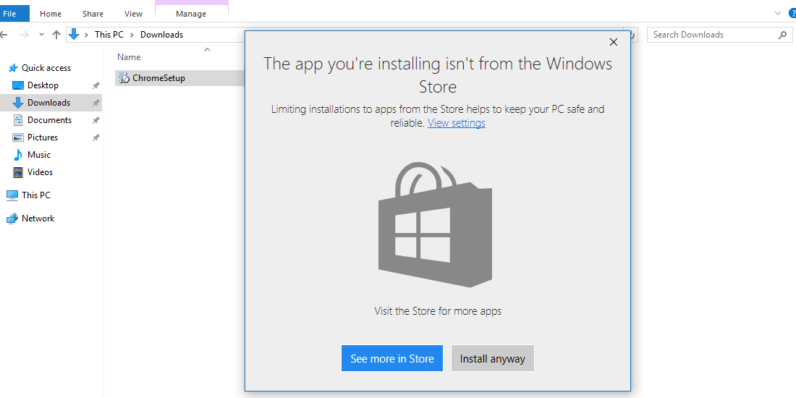From The Next Web:
It appears Microsoft wants users to start relying on its Windows Store a lot more in the future. The software titan is currently testing a new functionality in Windows 10 that prevents you from installing any desktop apps – unless they come from the official store.
MSPoweruser reports the feature will notify users with a warning anytime they attempt installing desktop apps. The notification will be accompanied by a message reminding users the Windows Store is the only “safe and reliable” place to satisfy your software needs.
While as of now the feature is disabled by default, users can head to the Apps and Feature category in Settings to enable it.
You will have the option to allow or block the installation of Win32 apps altogether, as well as the alternative to give priority to Windows Store apps without blocking standard desktop software – this will likely prompt you to approve installation any time you try running non-store apps.Actually fixing the Windows 10 Store so it doesn't suck, and fixing UWP so that Universal Apps run at least as well as their Win32 counterparts, apparently aren't options that Microsoft has much interest in doing.
MSPoweruser, by the way, are carrying water for Microsoft on this one, calling this "a brand new feature to Windows that will help prevent installation of bloatware in Windows 10." It isn't either of those things, of course: it's not new, and it's not about bloatware. Because the thing about bloatware is that it comes with the PC, from the factory, or bundled with the OS itself.
You see, OEMs like Compaq and Dell are not installing programs one-by-one on every new PC they sell; they're copying a disk image to each new hard drive from one with everything already installed, and then just activating the new Windows key. Preventing users from installing Win32 apps doesn't slow them down at all. Even disabling Win32 app installation by default woudn't stop the OEMs, who would only need to enable it once, install all their bloatware, and then disable it again, before copying their bloated hard drive image to every new PC they sell.
And Microsoft's own unwanted apps are, naturally, part of Windows, and thus Microsoft certified by default (and probably available from the Windows Store as well, in some cases), so this "new" "feature" doesn't do anything about unwanted Microsoft apps, either.
No, this isn't about bloatware. It's about pushing users to the Windows 10 Store, and while it's very carefully being made opt-in for the moment, don't forget that Windows Update can reset that without your knowledge or consent at any time.
Cue the Tim Sweeney meltdown in 3... 2... 1...
UPDATE:
I'd somehow missed this tidbit about the Windows Store, back when it first surfaced.From HowToGeek, via Slashdot:
Microsoft’s Windows Store is a mess. It’s full of apps that exist only to scam people and take their money. Why doesn’t Microsoft care that their flagship app store is such a cesspool?
It’s now been more than two years since Windows 8 was released, and this has been a problem the entire time, and it is getting worse. If Microsoft was trying to offer a safe app store to Windows users, they’ve failed.
Update:
Since this article was published and spread around the world, Microsoft has done a lot of cleanup in the Windows Store, removed 1500 scam applications, and has pledged to keep it clean.
We’re happy that they responded and cleaned things up, but only time will tell if they will keep it clean or not. Note: there’s still a lot more scam applications that they haven’t yet removed, so continue to beware until this mess is fully clean.So... yeah. Maybe keep side-loading enabled for now, and allow users to disable the Windows Store instead. Something which Windows 10 Pro customers used to be able to do, until Microsoft took that control away from them.
